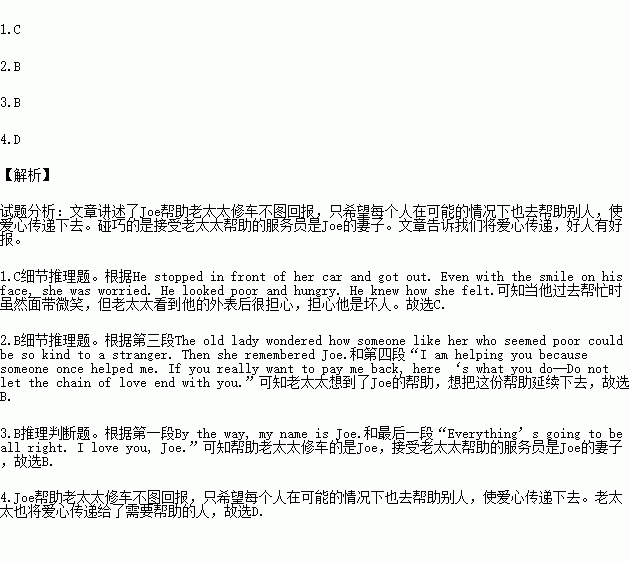题目内容
When he was driving home one evening on a country road, he saw an old lady, stranded(抛锚的) on the side of the road. He stopped in front of her car and got out. Even with the smile on his face, she was worried. He looked poor and hungry. He knew how she felt. He said’ “I am here to help you, madam. Why don’t you wait in the car where it’s warm? By the way, my name is Joe.”
She had a flat tire(轮胎). Joe crawled under the car, changed the tire. But he got dirty and his hands hurt. She could not thank him enough and asked him how much she owed him. He told her that if she really wanted to pay him back, the next time she saw someone who needed help, she could give that person the help they needed, and Joe added, “And think of me.”
She drove off. A few miles down the road the lady saw a small restaurant. She went in. The waitress had a sweet smile, and was nearly eight months pregnant(怀孕) The old lady wondered how someone like her who seemed poor could be so kind to a stranger. Then she remembered Joe. After the lady finished her meal, the waitress went to get her change from a hundred-dollar bill. But she stepped right out the door.
When the waitress came back, she noticed something written on a napkin(餐巾), “I am helping you because someone once helped me. If you really want to pay me back, here ‘s what you do--Do not let the chain of love end with you.”
That night when she got home, she was thinking about the money and what the lady had written. She and her husband needed money with the baby due (预产期)next month. She knew how worried her husband was, and as he lay sleeping next to her, she whispered, “Everything’s going to be all right. I love you, Joe.”
1.When Joe stopped to help the lady, she _______.
A. became excited B. refused his offer
C. was afraid to be hurt D. thanked him
2.Why did the lady leave the restaurant without getting her change?
A. She forgot it.
B. She wanted to give the waitress some help.
C. She would get it later.
D. She wanted to help Joe.
3.We can learn from the text that____________.
A. Joe’s boss fired him.
B. Joe’s wife was the waitress.
C. Joe worked as a driver.
D. Joe had an unhappy marriage.
4.By telling the story, the writer tries to show that_______.
A. helping others made oneself happy.
B. a happy family depends on a happy marriage
C. poverty is not a threat to a happy marriage.
D. kindness can be spread

